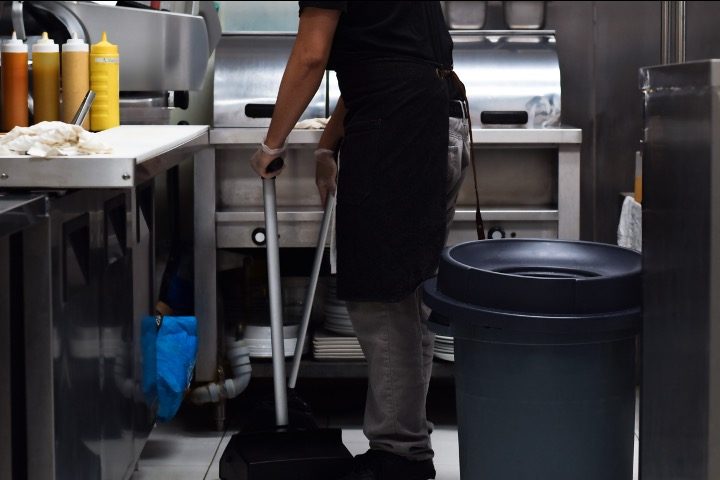
When California Governor Gavin Newsom announced he was raising the minimum wage for fast-food workers from $16 an hour to $20 an hour to be effective on Monday, April 1, he touted its “fairness”: “California’s taking one step closer to fairer wages and safer, healthier working conditions.”
Jason Boado, however, a worker at the Fosters Freeze store in Lemoore, California, thought it was an April Fool’s Day joke when he learned he’d lost his job, thanks to Newsom: “We got a text in our group chat about the shutdown, and I thought it was an April Fool’s joke.”
It was no joke for Boado. And not for his boss, the owner of the store, Loren Wright, either: “The last thing I ever wanted was to close down. By Friday night (before the new minimum wage law kicked in) I knew it was likely I couldn’t keep the store open.” He added that, thanks to the gradual rise in the minimum wages mandated by state law, “We’re all poorer than we were ten years ago.”
Mod Pizza closed all five of its California stores following the imposition of the new minimum wage. And Michael Ojeda, a Pizza Hut delivery driver, lost his job as his manager cut back on his staff in reaction to the new law. Said Ojeda, “Pizza Hut was my career for nearly a decade, and with little to no notice it was taken away.”
That is just the beginning of the new reality. As Walter Block, an Austrian school economist who teaches at Loyola University New Orleans, wrote:
The minimum wage is not an employment law; it’s an unemployment law.
It decrees who will not be hired — namely, anyone whose productivity is below the designated wage. It doesn’t create a floor, raising wages. It’s a hurdle that potential employees must clear in order to get a job.
And the higher it is, the harder it is to clear.
Block points out the lack of logic behind a government-mandated rise in the minimum wage. In 2021 he wrote:
If the minimum wage really were a rising floor, boosting everyone’s compensation as it rose in height, why stop at $15? Why not make it $150, or $1,500? We would all be rich!
And not just us. We could abolish foreign aid. Instead of sending money or CARE packages to poor countries, we could just advise them to institute a minimum wage or, if they already have one, raise it to the skies.
What is Newsom’s real agenda? In his unannounced candidacy to run for president in November (in the event that Joe Biden is tossed by his party’s insiders), he wants to appeal to the 500,000 fast-food workers working in his state. And he also wants to solidify his union support. Employers paying union workers $30 to $40 an hour would love to bring on lower paid workers. But such a notion is “nipped in the bud,” wrote Block. How? “By pricing them out of the labor market … through the minimum wage law.”
And it also fosters another progressive dream: reducing “income inequality” between owners and employees. An increase in the minimum wage is a form of income redistribution, from higher-income business owners to lower-income employees.
Also at work here is the “law of unintended consequences,” or, in Newsom’s case, the “intended” consequences. In 2021 the Congressional Budget Office (CBO) estimated that raising the federal minimum wage would benefit some but cost the jobs of millions of others. It would cause prices to rise as store owners try to adjust to their increased costs of doing business, which would dampen demand and slow the economy. And the federal government’s already soaring budget deficit would increase thanks to those higher prices inevitably seeping through the economy.
It’s simply this: If a potential employer is forced to pay an employee more than he’s worth, he won’t hire him. Instead, he’ll make other adjustments. He’ll hire part-timers, he’ll put his full-time employees on shorter work schedules. He’ll reduce their hours per week so that he won’t have to provide their health insurance.
The Harvard Business School blew the whistle on this charade. In 2021 it reported that “raising the minimum wage can actually have a significant negative impact [emphasis added] on the total compensation of hourly workers.” From its study:
For every $1 increase in the minimum wage, we found that the total number of workers scheduled to work each week increased by 27.7%, while the average number of hours each worker worked per week [decreased] by 20.8%.
For an average store in California, these changes translated into four extra workers per week and five fewer hours per worker per week — which meant that the total wage compensation of an average minimum wage worker in a California store actually fell by 13.6%.
And this decrease led to lost benefits for workers as well:
This decrease in the average number of hours worked not only reduced total wages, but also impacted eligibility for benefits.
We found that for every $1 increase in minimum wage, the percentage of workers working more than 20 hours per week (making them eligible for retirement benefits) decreased by 23.0%, while the percentage of workers with more than 30 hours per week (making them eligible for health care benefits) decreased by 14.9%.
Employers making these adjustments in order to survive actually cost workers “enjoying” an increase in wages nearly $1,600 a year for every additional dollar per hour that they get paid:
The combination of reduced hours, eligibility for benefits, and schedule consistency that resulted from a $1 increase in the minimum wage added up to average net losses of at least $1,590 per year per employee — equivalent to 11.6% of workers’ total wage compensation (and this is assuming that workers were able to use their reduced hours to work a second job — an assumption which may not hold true for many employees).
And there are other, non-economic costs to this governmental meddling in the economy:
- A sense of entitlement among those receiving a higher wage without working for it;
- A sense of false security, thinking that the government is really watching out for them;
- A slower economy as higher prices kick in;
- A breaching of the freedom of an employer to make a contract with an employee, based upon mutual agreement; and
- An increase in homelessness, as it further prices out of the market those with limited or nonexistent skills.
But Newsom couldn’t care less. He’s running for president and needs all the votes and support he can muster by giving to some while taking from others in his quest.



